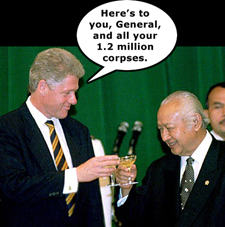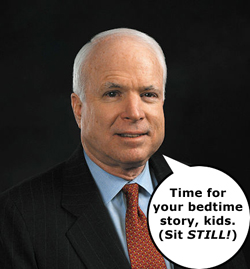Our favorite general.
Last year it was Pinochet. This year, Suharto meets his maker, though what demon fashioned him I shudder to  speculate on. More than mass murder and dictatorship united them; they also share the posthumous praise of pundits and political leaders the world over, some of whom have every reason to know better. One can only assume these apologists hold a cynical appreciate of the blood-soaked Indonesian general's ability to provide wealthy westerners with favorable investment opportunities in what was once seen as the super-domino of U.S. southeast Asia policy. Whatever the truth may be, news articles about Suharto's passing referred to him as a "modernizer" who brought his country into the global market, though with some level of brutality. His rule was "controversial" due in part to his having eliminated as many as 1 million "alleged communists" during his 35-year rule (not to mention the perhaps 200,000 killed in East Timor). This, according to new Australian Labor prime minister Kevin Rudd, amid "a period of significant growth and expansion," though Rudd admits, "many have disagreed with his approach." Including, presumably, the 1.2 million dead and their families. Can you imagine Pol Pot being so eulogized? (At least the syndicated article in my hometown newspaper compared Indonesia's mass killings with those of Cambodia - a comparison that once drew howls of derision.)
speculate on. More than mass murder and dictatorship united them; they also share the posthumous praise of pundits and political leaders the world over, some of whom have every reason to know better. One can only assume these apologists hold a cynical appreciate of the blood-soaked Indonesian general's ability to provide wealthy westerners with favorable investment opportunities in what was once seen as the super-domino of U.S. southeast Asia policy. Whatever the truth may be, news articles about Suharto's passing referred to him as a "modernizer" who brought his country into the global market, though with some level of brutality. His rule was "controversial" due in part to his having eliminated as many as 1 million "alleged communists" during his 35-year rule (not to mention the perhaps 200,000 killed in East Timor). This, according to new Australian Labor prime minister Kevin Rudd, amid "a period of significant growth and expansion," though Rudd admits, "many have disagreed with his approach." Including, presumably, the 1.2 million dead and their families. Can you imagine Pol Pot being so eulogized? (At least the syndicated article in my hometown newspaper compared Indonesia's mass killings with those of Cambodia - a comparison that once drew howls of derision.)
Pinochet enjoyed similar courtesies upon his departure - praise for the firm (if somewhat larcenous) hand on the tiller of the good ship Neoliberalism. One might almost forget that these creatures were cut from the same murderous cloth as Saddam Hussein (and quite frankly, Suharto made Hussein look like a choir boy). The trajectory of Saddam's career was similar to those of Suharto and Pinochet: a timely assist early on with military coups (Suharto and Pinochet) and botched assassination attempts (Saddam), culminating in full U.S. support through the worst of their atrocities. (In Suharto's case, this included CIA-supplied lists of names to be eliminated.) This is why, as reported on 60 Minutes last Sunday, Saddam apparently remembered Reagan quite fondly. 1981-89 was Saddam's bloodiest period cumulatively, and he got nothing but help from us the whole way through.
 A simple twist of fate would have had the corporate media and world leaders praising "Saddam the modernizer" at his graveside as well, were it not for his fateful transgression in 1990 (i.e. invading a country we're friendly with). Instead, he alone of the three is condemned unconditionally as a mass murderer, though perhaps his worst crimes - deadly attacks against the Iranians, whose county he invaded - typically go unmentioned, despite the extensive use of chemical weapons. Clearly, neither mass murder, nor unprovoked invasion, nor the use of non-conventional weapons, is a problem for our leaders, since they have committed (in our names) crimes just as serious over the past few decades. Not surprisingly, British researchers have completed a study that estimates the number of dead in Iraq at around 1 million. That more or less comports with Les Roberts' study of 18 months ago. The Bush administration and its supporters on both sides of the mainstream political divide are definitely in Suharto-Rwanda land, having long since moved past Pinochet and Saddam.
A simple twist of fate would have had the corporate media and world leaders praising "Saddam the modernizer" at his graveside as well, were it not for his fateful transgression in 1990 (i.e. invading a country we're friendly with). Instead, he alone of the three is condemned unconditionally as a mass murderer, though perhaps his worst crimes - deadly attacks against the Iranians, whose county he invaded - typically go unmentioned, despite the extensive use of chemical weapons. Clearly, neither mass murder, nor unprovoked invasion, nor the use of non-conventional weapons, is a problem for our leaders, since they have committed (in our names) crimes just as serious over the past few decades. Not surprisingly, British researchers have completed a study that estimates the number of dead in Iraq at around 1 million. That more or less comports with Les Roberts' study of 18 months ago. The Bush administration and its supporters on both sides of the mainstream political divide are definitely in Suharto-Rwanda land, having long since moved past Pinochet and Saddam.
What's next? John McCain, who sounds like he's undergoing anger management training every time he reads a speech? More bodies to come, looks like.
luv u,
jp
Comments